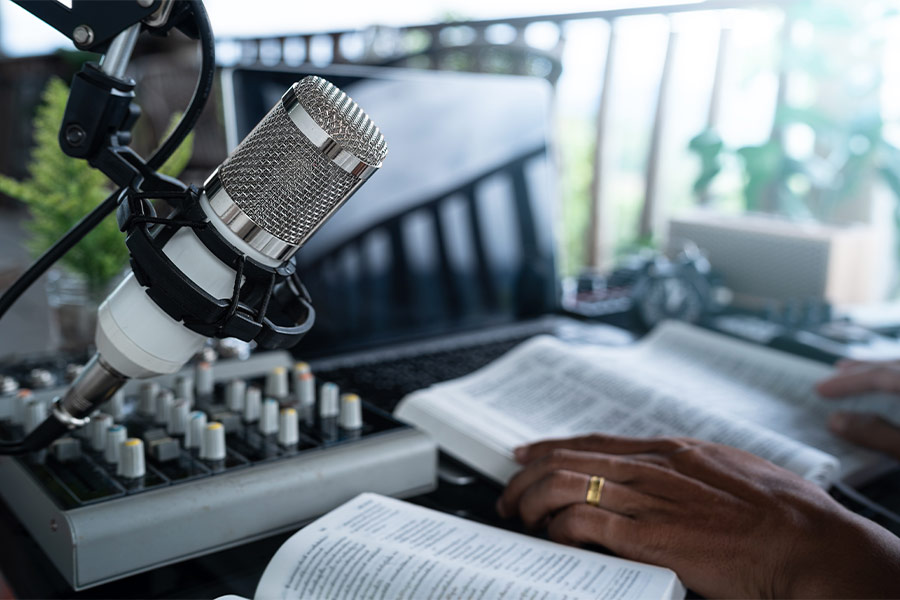
Online streaming has become one of the most popular ways for people to consume content. Most radio stations now broadcast their programming online, allowing people to listen even when they are not in the car or near a traditional radio.
As with any other platform, all broadcasters should be given the same opportunities to share their message via online streaming—including religious broadcasters. The First Amendment to the U.S. Constitution and the federal Religious Freedom Restoration Act both guarantee this right.
But government bureaucrats adopted new royalty rates that violate religious broadcasters’ rights and place them at a severe disadvantage.
How has the Copyright Royalty Board changed the rates?
If broadcasters want to stream copyrighted songs over the internet, they must pay royalties to the songs’ copyright owners. Every five years, a federal agency called the Copyright Royalty Board (CRB) issues a statutory license that establishes the terms and royalty rates these broadcasters must pay.
In 2021, the CRB adopted royalty rates for noncommercial National Public Radio (NPR) webcasters that had been jointly proposed by NPR and SoundExchange, a representative for record companies. Religious webcasters, represented by the National Religious Broadcasters Noncommercial Music License Committee (NRBNMLC), proposed two rate suggestions modeled after the NPR rates that would provide religious broadcasters the same opportunities to reach listeners.
The CRB rejected the religious broadcasters’ proposals. Instead, it adopted a proposal from SoundExchange that requires noncommercial religious webcasters with an average audience of over 218 people to pay royalty rates more than 18 times the average rate for NPR stations. The rate structure gives religious broadcasters an unconstitutional choice: suppress your speech or pay exorbitant fees.
After the CRB adopted these discriminatory rates, the NRBNMLC appealed the ruling to the U.S. Court of Appeals for the D.C. Circuit. But the circuit court ignored the CRB’s religious discrimination, failed to correctly apply multiple statutes, and affirmed the rate structure.
Why did ADF ask the Supreme Court to hear the case?
The Copyright Royalty Board’s unequal rate structure violates both the First Amendment and multiple federal statutes.
To begin, the CRB violated the First Amendment by treating noncommercial religious broadcasters worse than some secular broadcasters. Under the current rate structure, a Christian station streaming 15 songs per hour to an average audience of 1,000 people online must pay over $257,000 annually. In contrast, NPR stations would only have to pay $18,000 annually to reach the same audience. These lopsided rates burden religious broadcasters’ exercise of religion and suppress their speech.
In addition, the CRB has run afoul of three federal laws.
The Religious Freedom Restoration Act (RFRA) stipulates that if the government burdens a person’s exercise of religion, it must prove that it has a compelling interest in doing so and that its action is the least restrictive means by which to achieve that interest. The appeals court should have applied this test, but it did not. Instead, the court turned a blind eye to the CRB’s religious discrimination and affirmed its rate structure
The Administrative Procedure Act (APA) instructs courts to “hold unlawful and set aside agency action, findings, and conclusions” that are “arbitrary, capricious, an abuse of discretion, or otherwise not in accordance with law.”
When the NRBNMLC proposed its rate suggestions in line with the NPR rates, the CRB refused to accept them. Instead, it claimed that NRBNMLC needed to provide expert testimony in support of its proposal, which had never been a requirement before. CRB invented this requirement after the fact, meaning NRBNMLC had no chance to comply with it.
Under the APA, the appeals court should have held this unexplained and arbitrary change unlawful. Instead, it affirmed the new rule based on faulty logic.
The CRB incorrectly applied the Copyright Act to bar evidence supporting the NRBNMLC’s position in its rate proposals, and the appeals court affirmed this misreading of the law.
Since the lower court ignored the CRB’s First Amendment violations and failed to correctly apply statutory law in its review of the board’s actions, attorneys from ADF and Fletcher, Heald & Hildreth asked the U.S. Supreme Court to hear the case. Unfortunately, the Court declined to hear the case, allowing the lower courts’ decisions to stand.
NRBNMLC v. Copyright Royalty Board and Librarian of Congress
- October 2021: The CRB formally adopted royalty rates for calendar years 2021 through 2025 that require noncommercial religious webcasters with more than 218 average listeners to pay over 18 times the secular NPR-webcaster rate.
- July 2023: The D.C. Circuit Court ignored the CRB’s religious discrimination, failed to correctly apply multiple statutes, and affirmed the rate structure.
- February 2024: ADF attorneys, along with attorneys from Fletcher, Heald & Hildreth, asked the U.S. Supreme Court to hear the case.
- June 2024: The Supreme Court declined to hear the case, allowing the lower courts’ rulings to stand.

